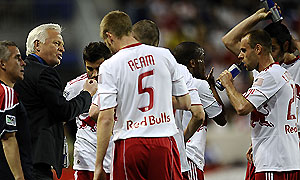
With the MLS season winding down, potential head coaching vacancies will start to garner a lot of attention in the media and with fans.
D.C. United will be the initial point of attention, as the club will soon turn its full attention to the head coaching position. Ben Olsen has been the interim boss during his first year as an assistant after Curt Onalfo's abrupt dismissal in August.
While United President Kevin Payne has stated that Olsen is likely to lead United someday, he has also suggested that Olsen lacks the experience to guide the club at this time. To Olsen's credit, the players have responded to his impassioned pleas to play for the badge and salvage something from this season.
The buzz in soccer circles is that Olsen, despite initial uncertainty, would very much like a crack at the permanent job. The buzz in soccer circles is also that United plans to initially focus on experienced foreign candidates.
Steven Goff of the Washington Post writes of the varying backgrounds of coaches leading the five best MLS clubs this year:
THE FOREIGNER (New York's Hans Backe): Few, if anyone, in the States knew of this Swedish coach before his arrival last winter. It was a bold hire defying conventional thinking that outsiders untrained in the American system are bound to fail. While marquee player acquisitions have served a big part in the Red Bulls' turnaround, Backe has shown the temperament, perspective and tactical keenness to mold a championship contender. The support of Richie Williams, a former MLS player and holdover assistant, undoubtedly eased the transition and filled in the gaps.
United's options: There are numerous experienced coaches in Europe and Latin America, with a wide range of fame and success, who surely would love the opportunity to coach in the States. As the Red Bulls have proven, a big name is not essential. Salary would be an issue -- United doesn't have Real Madrid's budget, or even Real Sociedad's budget. One name that has floated around: former Newcastle and England manager Kevin Keegan. A realistic target, though?
THE ASSISTANT (Columbus' Robert Warzycha): After seven years as a player for the Crew, the Poland native served as a club assistant for six seasons. When Sigi Schmid bolted for Seattle, Warzycha inherited the top job and proceeded to guide Columbus to a second straight Supporters' Shield in 2009. This year, the Crew is atop the Eastern Conference heading into the final month of the regular season.
United's options: Besides Olsen, other notable assistants include New York's Williams, who interviewed for the D.C. job last year; Real Salt Lake's Robin Fraser, the former MLS defender in his fourth season with the reigning champions; Los Angeles' Dave Sarachan, the former DCU and national team assistant who guided Chicago to an MLS Cup appearance and is now happily helping Bruce Arena and living in SoCal paradise; and Philadelphia's John Hackworth, who worked in the U.S. national team system.
THE ESTABLISHMENT (Los Angeles' Bruce Arena): After his rebuilding efforts in New York were cut short, Arena has managed the tricky David Beckham-Landon Donovan dynamic and introduced several newcomers en route to a 2009 MLS Cup appearance and the pole position in the 2010 Supporters' Shield race.
United's options: There's only one Bruce Arena, and he's not coming back to clean up the mess at RFK. Had the USSF not retained Bob Bradley, he might have become a candidate. The U.S. under-20 coach, Thomas Rongen, already guided United, from 1999 through 2001.
THE PLAYER (Real Salt Lake's Jason Kreis): In June 2007, Kreis went from player to coach in the blink of an eye, retiring as the league's career scoring leader to succeed John Ellinger. Working with another former player turned decision-maker, General Manager Garth Lagerwey, Kreis has settled into the position nicely: the league trophy last year and contending status this fall.
United's options: An exiting player is not going to be hired for this head position. (Sorry, Jaime Moreno and Brian McBride.) D.C. legend Marco Etcheverry's name comes up time to time, but beyond sentimentality, he has never been viewed as a viable candidate. If United is interested in a former high-profile player with vast life experiences, leadership qualities, a coaching gig in his past, respect in American circles and European connections, what about Hall of Famer Thomas Dooley? The German-American had 81 caps for the U.S. team, started in two World Cups, captained the 1998 squad, played four years in MLS and coached Saarbrucken in Germany for one season before settling in Southern California. He has worked in youth coaching, earned his FIFA coaching license in Germany and been involved with a statistical analysis company. His lack of recent club coaching experience would probably hurt his cause.
THE COLLEGE MAN (Dallas' Schellas Hyndman): At a late stage in his career, Hyndman left Southern Methodist University after 24 seasons to dip into the professional ranks. Some questioned whether he could make the transition, but after not making the playoffs last year, he has guided FCD to a 11-2-13 record and emerged as the leading candidate for coach of the year honors.
United's options: Akron's Caleb Porter turned down DCU last year and Maryland's Sasho Cirovski, a hands-on and demanding coach, would want more control than any club would allow. Wake Forest's Jay Vidovich is also highly regarded. With United in need of an immediate turnaround after two mediocre seasons and an awful one, the club doesn't have the luxury to allow a newcomer to grow into the job.


















